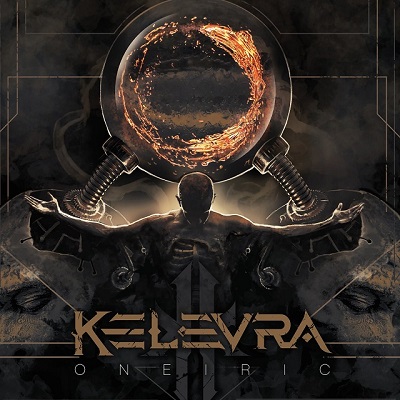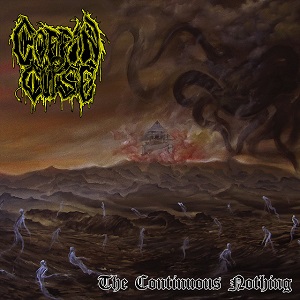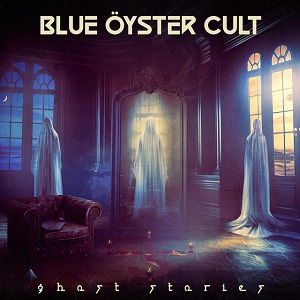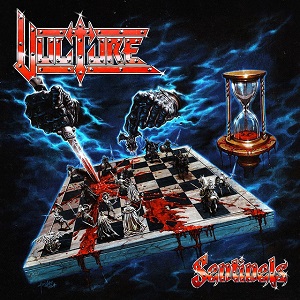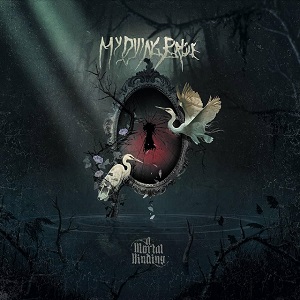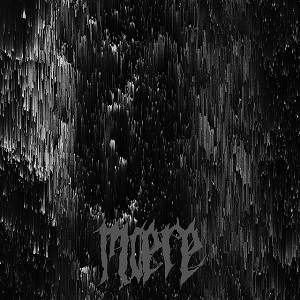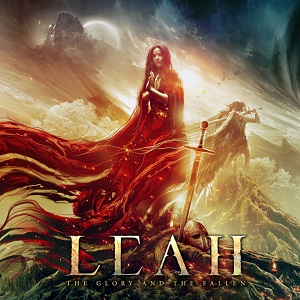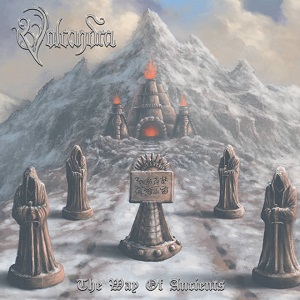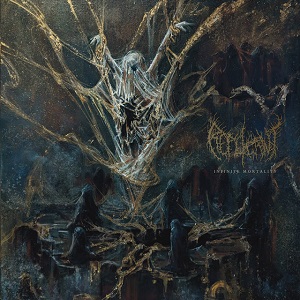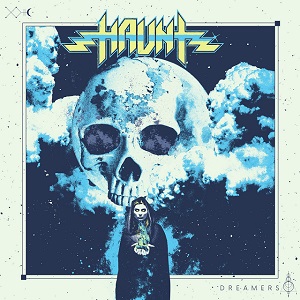QUEENSRŸCHE - Operation: Interview II
July 21, 2006, 17 years ago
By Mitch Lafon
A mere six months ago, I sat down with QUEENSRŸCHE’s Geoff Tate to discuss the forthcoming Operation: Mindcrime II CD. That release has now come and gone and work has begun on the band’s most ambitious tour to date – a two hour plus ‘theatrical’ and sequenced presentation of both Mindcrime albums – with that in mind I sat down with Geoff for a second chat about the band’s current fortunes.
Mitch Lafon: You’re doing Operation: Mindcrime I & II as a big extravaganza tour. What can you tell me about it?
Geoff Tate: “Well, it’s a dramatic presentation. It’s a lot like a theatre show in respect that there’s actors portraying the different characters, there’s film screens and special effects. It’s not just a rock presentation. It’s an augmented rock presentation. The whole thing is set up in surround sound. It’s a very visual as well as an interesting audio presentation. Lots of special effects and swirling things going on with the surround sound. It’s a very cool show and we spent a lot of time putting it together to make it interesting for people.”
ML: You’re doing every song from both albums? You’re not skipping any and it’s in order?
GT: “Yeah, it’s all chronological.”
ML: How are fans responding to it so far?
GT: “Well, we haven’t played the whole thing yet. But we just got back from a tour of Europe and Australia where we played ‘excerpts’ from Operation: Mindcrime I & II and it went down great. People loved it! I think it definitely left them with an interest to delve into the record deeper.”
ML: Let me ask you about Operation: Mindcrime I. It’s just been re-released by EMI as a deluxe edition remaster (with bonus live disc and DVD). What would Queensryche be right now if Operation: Mindcrime had never come out?
GT: “I would like to think that we would still be making music. You know Operation: Mindcrime was a brick in the construction of the band and our progress. It was a great moment for us as far as being in the right place at the right time with an interesting record. It was considered underground because not too many people knew about it and it gave people in the power positions in the media the chance to throw down a relatively unknown group and say ‘hey, listen to this. Isn’t this cool?’ So, that was interesting to watch that whole thing develop. When the album first came out, for about a year, it sold as many records as our previous records. Probably 200 000 records or something like that, but then we made a video for MTV and they got behind it and pushed the single ‘Eyes Of A Stranger’ and ‘boom’ it shot up to 500 000 and then ‘boom’ a million and then ‘boom’ two million.”
ML: The concept of the album itself was a risk. Back in the day, you had Poison and Skid Row out there and all kinds of bands doing exactly what Operation: Mindcrime wasn’t and on top of that – it’s a concept album and it’s talking about politics. What made you decide to take that risk? It could have been the end of Queensrÿche.
GT: “I suppose, but I don’t like to think in terms that are so final... so fatalistic.”
ML: But it was a big risk for the market place back then.
GT: “I suppose so, but it didn’t seem like it to us at the time. We were just doing what was interesting to us. We had been moving in the direction of making concept or themed records. Our first full-length LP, The Warning, was a loosely based theme album and Rage For Order which came after that was a themed record and we really wanted to do something that was more of a solid story all the way through, so Mindcrime was just the next step for us in our musical wish list of things to do and accomplish.”
ML: Now, Mindcrime II – the continuation of the story twenty years later, but of course things haven’t really changed in the world. We’ve got a Bush in the White House and trouble in the Middle East.
GT: “I think we’ll always have problems in the Middle East. Ever since I can remember (sometime in the ‘60s), we’ve had problems in the Middle East. Every day, as is my habit, I turn on the news in the morning and every day... there’s NOT a day that goes by that they’re not reporting on violence in the Middle East... it’s an every day occurrence.”
ML: The best thing to do if you want to escape reality is watch Fox News.
GT: (laughs) “Yeah!”
ML: So – tell me about coming back to the story twenty years later.
GT: “Originally, we had planned on releasing the sequel to Mindcrime after the Empire album (which came out in 1990) and it was meant to be in the place of Promised Land, but the band just wasn’t in the right head space to continue the story at that point. We were all so affected by the commercial success of Empire and being on the road for a couple of years and some of us had gotten married in that time period... some of us were divorced. There was just a lot of turmoil in the band at that point and we wanted to write about that – what was going on at the time. So, the Mindcrime sequel got pushed back and because of that direction we took that lead us on to the next album and that lead us on to the next album. So, we found ourselves in a different orbit.”
ML: You had even abandoned the idea of making Mindcrime II...
GT: “Yeah, I had begun it, had it sitting on my computer and returned to it periodically... to update it and add stuff to it and to reminisce, but I always put it away until a couple of years ago when I started reading through it and it started making sense to me. It fit the times we were in very well (I thought) and it just seemed like the right place to be (for me at least). I began working on it and brought it to the guys and said ‘this might be the next thing for us’ and miraculously we were all on the same page. Everybody was very keen on returning to the story and trying to give it a modern feel – let’s set it in these times, but still retain elements of the musical landscape we had created in the past. So, magically it came to fruition and I’m always surprised when that happens. It’s tough getting five individuals on the same page and everybody working towards the same goal and everybody seeing the same light at the end of the tunnel. So, when it does happen – it’s a great thing and you run with it.”
ML: The story this time around seems less open-ended... it has closure. It is or is there room for Mindcrime III?
GT: “No, I don’t want to do something like that. I approached this as ‘the conclusion’ and making it so that ‘Nikki’ (the character) spends twenty years in jail and getting more and more upset and wanting to take revenge on the man he blames for him being in jail. So, he gets out of jail and goes after Dr.X – so the story is really about revenge. The twist is – what happens when you accomplish that? Does it really make you feel better? Does it improve your life? Does it give you a reason to continue? So, that’s what I tried to explore with the story and the conclusion is: what’s the aftermath of revenge?”
ML: Would you be willing to start a new series or new concept for an album?
GT: “Funny you should mention that – that’s what we’re working on now. We’ve begun work on the next Queensrÿche record and it is a story... pretty intense and in-depth story and I can’t really discuss too much of it. It doesn’t have anything to do with Mindcrime, of course, but it’s proving to be very satisfying working on it. Everybody in the band is very keen and excited on developing and working within the conceptual realm right now.”
ML: Let’s go back to the tour – in particular Montreal. You’re in Montreal on November 12th at Le Metropolis. The city has a special place for you since you lived here for a bit – what does the city mean to you?
GT: “Actually, Mindcrime I was conceived in Montreal. I wrote the story there and I don’t know what it’s like now, but on Rue St. Denis there’s a club there called the St. Sulpice and I used to go there a lot. That’s where I met the character that I patterned Dr. X off of. That’s where I sat in the corner drinking and writing in my journal and coming up with the story. I don’t know what the club is like now – it’s probably a disco or something.”
ML: I think it’s a young yuppie place now...
GT: “Well, at least it has some history for hard rock fans.”
ML: Do you look forward to playing Montreal?
GT: “Always! We get a very good reception from the fans in Montreal. People there are very passionate about music and when you perform – you feel them. It’s a give and take energy between the performer and the audience. That’s a really special thing and, unfortunately, becoming more and more rare especially in America – we’ve been developing this generation of people that are so used to watching television that they pretty much sit there.... I mean they’re involved, but it’s only a visceral involvement or...”
ML: A passive involvement?
GT: “Yeah – it seems to us that we’re on television and they’re sitting in their living room munching on popcorn and watching a movie. It’s very odd, but not in Montreal. It’s a very passionate city with passionate people that really get into the show. They give you so much energy that you find yourself performing above your ‘performance bar’. After the show, you feel exhilarated and want to do it again now!”
ML: That’s why this will be a great show and for those who do sit back – you’ve got the screens!
GT: “Yeah, but the way the screens are built into the show it’s a little more involved than a big screen just sitting there.”
ML: Other than the tour – what’s next?
GT: “I’m so busy I can hardly pay attention. Today, is my last day of shooting film for the show and then we got into the editing phase and then we start rehearsals on August 1st. It’s a very involved rehearsal with the actors and getting the set together. At the same time, I’ve got a solo record that’s half-way finished and I’ve got the new Queensrÿche record that we’ve begun and I’m doing a side-project with a whole different group of individuals who’ve come together to write a record. So, I’ve got three musical projects in the works and in October we’re filming the Operation: Mindcrime I & II show for a special DVD. That’s another whole thing that’ll be intense, so somewhere around Christmas I’m going to disappear for a month. I’ll take my family to some place warm and lay on a beach.”
ML: Just stay out of the Middle East...
GT: “Yeah – I’ll stay out of the Red Sea.”
ML: Go to Fiji or Tahiti... Now, you’re first solo album was a grand departure from Queensrÿche. Very personal, very introspective... what’s the second one going to be like?
GT: “Describing it – is always so darn hard. Musically, it’s quite a departure from the first solo record. Less atmospheric and mid-tempo, but very intense and heavy. Lyrically, it’s still of a personal nature, but it follows a bit of a theme throughout. It’s similar in that I’m using a lot of different musicians and writers to collaborate with, but musically it’s very different.”
ML: Let me ask you about ‘heavy’. Over the last few albums, Queensrÿche sound has been a lot less ‘heavy’ or heavy metal as some fans or writers would like – Mindcrime II seems to capture it again. Do you want Queensrÿche to continue in the direction of ‘heavy’ or do you want to go back to more experimental?
GT: “We always had a hard time defining what heavy is. I’ve done an impromptu scientific research project into finding out what ‘heavy’ is and what I found out is that everyone has a different definition of what it is. So, it’s difficult to grasp what heavy is and then also try to please everyone. So, I gave that up.”
ML: On Mindcrime II you’ve cranked the guitars and bass real loud – so that’s good!
GT: “The dramatic change on Mindcrime II – other that trying to capture a similar musical soundscape – is that we went back to A 440 tuning (nobody outside of music will understand this), but it’s a way of tuning the guitars so that they ring differently and over that last few records we’ve done these more alternative tunings – Drop D and half-step tunings and strange things like that – that make the music sound very different. But for Mindcrime we went back to A 440 like the original (Mindcrime).”
ML: It’s not just the guitars – Scott’s drums sound like the first Operation: Mindcrime over the last few albums he was doing different beats and whatnot...
GT: “Over the last few albums, Scott was experimenting with loops and different stuff like that and on this record he went back to ‘standard’ drumming.”
ML: For the next album, do you want to stay in that mode or go back to experimenting?
GT: “I’ve been advocating A 440 for a few years now because I sing better in A 440. The notes and the chords sound correct to me... they sound right! A lot of people turn to different tunings because they can’t sing in A 440 – so they drop it down so they have more range, but for me that’s not an issue. For us, it was our guitarist, Michael Wilton, specifically that really wanted to experiment with all these different tunings because from a guitar standpoint it’s kinda cool. Makes your guitar sound different and after years and years of making records, you’re always looking to do something different. You got to keep it interesting for yourself. But I finally convinced him on going with A 440 and he came to me the other day and said ‘ you know I’m really big into this A 440 thing. I don’t know if it’s because it sounds better or I’m liking it because it’s different to what I had been doing’. So, for right now – we’re in love with A 440 tuning and what we’ve written is in A 440. So, it’ll be similar to Mindcrime II.”
ML: I like the sounds of that... Anything else we need to plug? Obviously – www.queensryche.com
GT: “One of the cool things we’re doing on this tour is a charity motorcycle ride that’s tied in to VH1’s Save The Music... I don’t know if it’s like this in Canada, but in the United States over the last few years the leadership of our country has decided that music classes are a waste of time. So, they’ve taken the classes out of school all over the country – so kids don’t get the opportunity to play in ‘band’ or express themselves creatively and I feel that’s a detriment to the culture because people need to express themselves and music is a great communication tool. It’s a great way to learn team work (outside of sports), it’s a discipline and it helps with math skills.”
ML: That’s what I was going to say – the research out there suggest a strong link between math skills and music learning...
GT: “Save The Music is a great program that has put millions and millions of dollars into different school systems around the country to bring music classes back. It’s a great thing and I feel very proud to be a part of that. On our end – Buell Motorcycles (a division of Harley Davidson) has donated two bikes for the tour that I and Stone (guitarist Mike Stone) are riding from city to city. People can go to our web (www.queensryche.com) and click on the Buell/Save The Music banner and it’s tells you all about donating and riding with us. In New York City – 4000 people have signed up for it. They’ll close off the Holland Tunnel and we’ll get a police escort into Manhattan – it’s very cool and things like that are going on all across the country and I think we’ll do that in Canada too. If people want to get involved or donate cash to a very worthy cause – please click on the information on our web site. At the end of the tour we’ll be auctioning off the two Buell bikes we’re riding with customized Queensrÿche graphics... they’re one of a kind bikes.”
ML: That’s great – and as always it’s been a pleasure talking to you and I look forward to seeing you on November 12th!
GT: “Alright man - always a pleasure and come on out on the 12th we’ll have a chat and a beer or whatever! Take care and have a good summer.”

